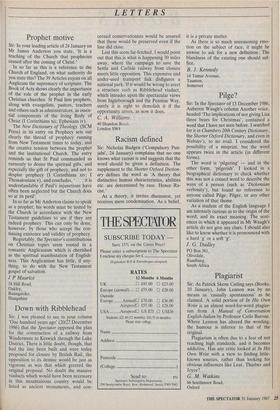LETTERS Prophet motive
Sir: In your leading article of 24 January on Mr James Anderton you state, 'It is a teaching of the Church that prophecies ceased after the coming of Christ.'
In so far as this is a reference to the Church of England, on what authority do you state this? The 39 Articles enjoin on all Anglicans the supremacy of scripture. The Book of Acts shows clearly the importance of the role of the prophet in the early Christian churches. St Paul lists prophets, along with evangelists, pastors, teachers and others such as administrators, as essen- tial components of the living Body of Christ (I Corinthians xii; Ephesians iv). , The New Dictionary of Theology (SCM Press) in its entry on Prophecy sets out clearly the thread of prophecy running from New Testament times to today, and the creative tension between the prophet and the institutional Church. The entry reminds us that St Paul commanded us earnestly to desire the spiritual gifts, and especially the gift of prophecy, and not to despise prophecy (I Corinthians xiv; I Thessalonians v), and concludes, ' . . . it is understandable if Paul's injunctions have often been neglected but the Church does so at its peril'.
In so far as Mr Anderton claims to speak as a prophet, his words must be tested by the Church in accordance with the New Testament guidelines to see if they are indeed prophecy. This can only be done, however, by those who accept the con- tinuing existence and validity of prophecy.
Regretably, the Spectator's contributions on Christian topics seem rooted in a romantic Anglicanism which is cherished as the spiritual manifestation of English- ness. This Anglicanism has little, if any- thing, to do with the New Testament gospel of salvation.
J P Maurice
34 Hill Road, Oakley, Basingstoke, Hampshire



































 Previous page
Previous page